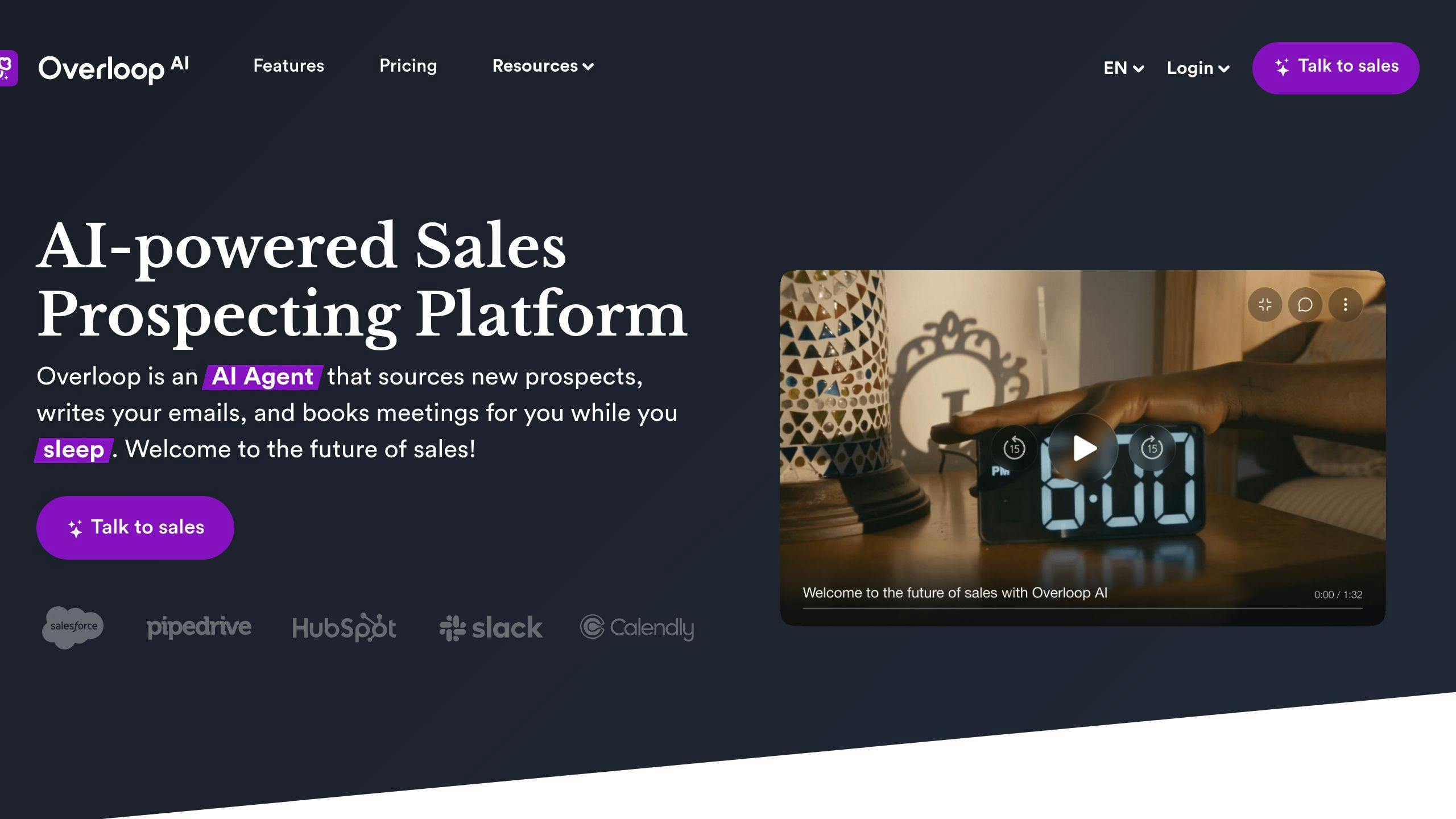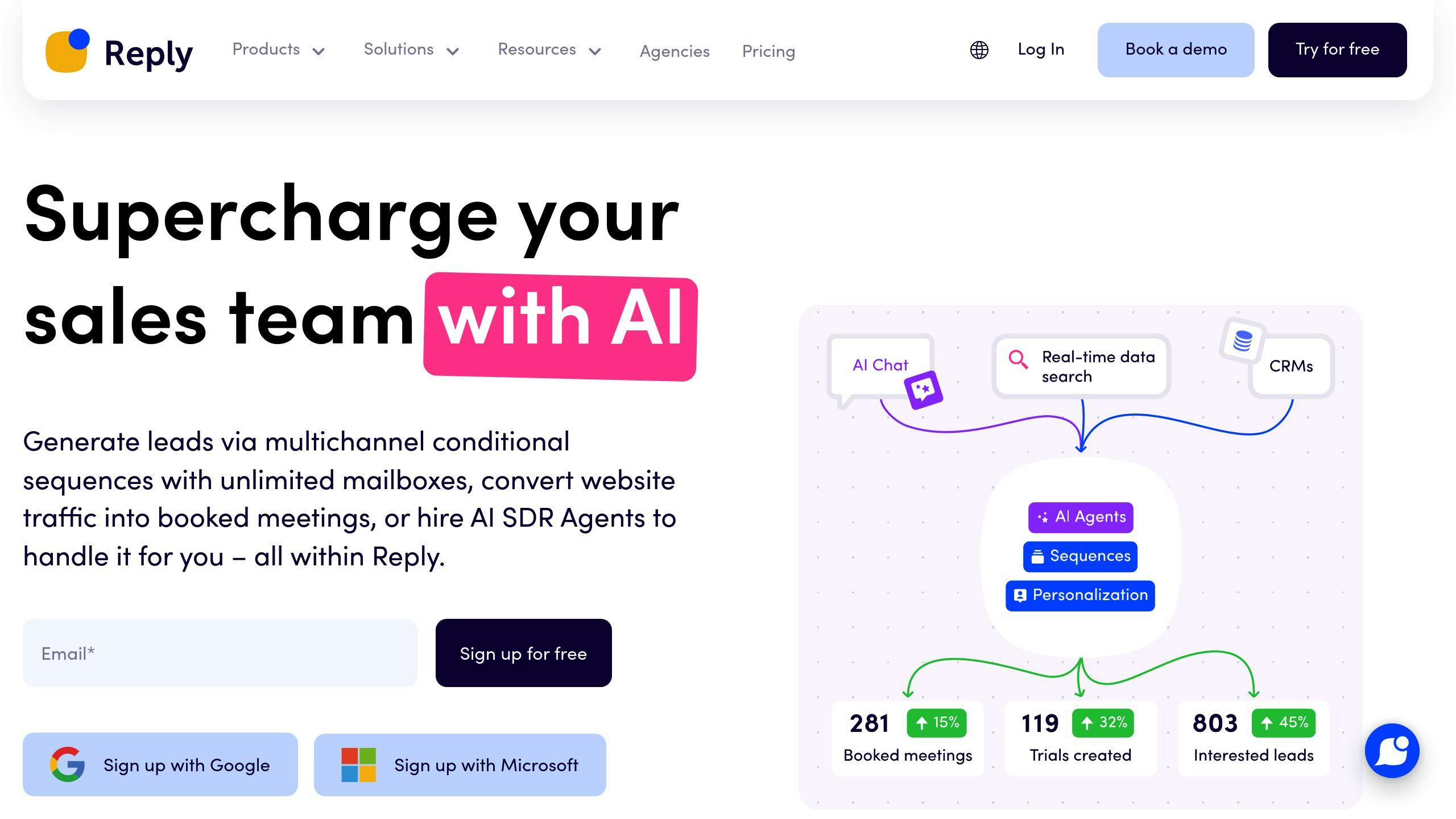AI follow-up scheduling helps sales teams save time and close more deals by automating timing, personalization, and consistency. Here’s why it works:
- Faster Responses: AI ensures follow-ups happen at the right time, increasing lead qualification rates by up to 7x.
- Personalized Outreach: Tailored emails see 26% higher open rates, improving engagement and conversions.
- No Missed Opportunities: Automated workflows keep communication steady, even when sales reps are busy.
Tools like Overloop AI, Reply.io, and Apollo.io integrate with CRMs to streamline processes, track interactions, and provide actionable insights. By using AI, teams can focus on building relationships while improving productivity and results.
How To Automate Your Sales Call Follow-up Process with AI
Benefits of Using AI for Follow-Up Scheduling
AI-driven follow-up scheduling has transformed the way sales teams handle prospect communication. Here’s how it boosts sales efficiency and effectiveness.
Personalized Follow-Ups for Stronger Connections
AI analyzes customer behavior - like email opens and link clicks - to help create messages that truly connect [3]. Personalized emails, for instance, see 26% higher open rates [3]. By focusing on what resonates with each prospect, sales teams can improve conversion rates while cutting down on wasted effort.
Perfect Timing for Better Responses
Timing is everything in sales, and AI uses historical engagement data to pinpoint the best moments to reach out [1]. This data-driven precision boosts response rates and improves lead qualification. Plus, consistent follow-ups - another critical factor in closing deals - become much easier to manage.
Never Miss a Follow-Up Again
Research from Marketing Donut shows that 80% of sales require at least five follow-up calls, yet 44% of sales reps quit after just one [3]. AI tackles this issue by automating follow-ups, ensuring a steady communication flow and no missed opportunities.
With AI, follow-up timing is automated, interactions are tracked in real time, and responses are triggered instantly. For example, if a lead revisits your website or downloads new content, the system can automatically send a relevant follow-up [2]. This frees up sales reps to focus on meaningful conversations and building relationships [3].
AI Tools That Improve Follow-Up Scheduling
Sales teams today depend on AI tools to make follow-up scheduling easier and more efficient. Here’s a look at some top solutions reshaping how follow-ups are managed.
Overloop AI: Smarter Follow-Ups with Automation

Overloop AI simplifies follow-up management by automating tasks like sending personalized emails and running multi-channel campaigns. It integrates seamlessly with platforms like LinkedIn, Salesforce, and Gmail, ensuring all your data stays connected.
The tool uses AI to fine-tune message timing, tailor content to each recipient, and adapt sequences based on how prospects respond. This approach helps businesses strike the right balance between automation and personalization. Companies using Overloop AI have reported up to a 30% increase in response rates and better conversions through its scheduling features.
Other Tools: Reply.io and Apollo.io

Reply.io specializes in email automation with tools designed for advanced sequencing, while Apollo.io goes a step further by combining lead scoring, follow-up automation, and pipeline management. Both tools leverage AI to ensure follow-ups are sent at the right time and align with where prospects are in the sales process.
For sales teams aiming to scale their efforts without losing the personal touch, these tools are game-changers. They not only simplify the follow-up process but also help boost team productivity and effectiveness.
How AI Improves Sales Team Productivity
AI-driven tools have transformed the way sales teams operate, streamlining repetitive tasks and offering actionable insights. This allows teams to focus on activities that directly lead to more conversions, saving time and boosting productivity.
Using Data to Refine Follow-Up Strategies
AI uses performance metrics to craft smarter follow-up strategies. For instance, emails with personalized subject lines see a 26% higher open rate, showing how AI can elevate performance tracking [3].
| Metric | AI Insight | Strategic Advantage |
|---|---|---|
| Email Open Rates | Pinpoints best times to send | Ensures follow-ups land during peak engagement |
| Response Times | Monitors prospect behavior | Optimizes timing for future outreach |
| Click-Through Rates | Evaluates content performance | Improves message quality and calls-to-action |
Adapting Follow-Ups to Customer Behavior
AI adjusts follow-ups in real-time based on customer interactions. This ensures sales reps stay on track and avoid missing opportunities due to inconsistent follow-up efforts.
"AI schedules interactions precisely, boosting conversion rates." - Intelemark [1]
With AI, sales teams can:
- Perfect timing: Follow-ups are timed to align with customer behavior, keeping the conversation alive.
- Tailor messages: Content is customized based on engagement history, making outreach more relevant.
- Ensure consistency: Automated workflows prevent missed opportunities, keeping leads engaged.
Platforms like Overloop AI and similar tools make these results achievable by integrating advanced automation into sales workflows. By analyzing data and adjusting strategies on the fly, these tools help teams work smarter and more efficiently.
Tips for Adding AI to Follow-Up Scheduling
Using AI for follow-up scheduling can make a big difference, but it requires attention to two key areas: integrating it with your systems and preparing your team to use it effectively.
Connecting AI Tools with CRM Systems
Integrating AI tools with your CRM ensures data flows smoothly and workflows are automated, saving time and effort. A well-integrated system sets the stage for smarter, data-driven follow-ups.
| Integration Aspect | Key Benefit | Implementation Focus |
|---|---|---|
| Data & Workflow Management | Centralized data tracking and automated sequences | Configure syncing and triggers |
| Performance Analytics | Real-time insights into follow-up effectiveness | Enable analytics dashboards |
Once your systems are connected, the next step is to make sure your sales team knows how to use these tools.
Training Sales Teams to Use AI Tools
Training should focus on real-world applications rather than just theory. Hands-on practice helps teams understand how AI can improve their daily tasks.
"AI helps develop effective strategies for future engagements by analyzing previous interactions." - Attention [1]
Key training areas include:
- Understanding AI insights to make better decisions
- Balancing automation with a personal touch in workflows
- Maintaining accurate data to maximize AI's potential
Regular support and updates ensure your team stays informed and confident in using AI tools. The goal is to make these tools a natural part of their day-to-day work, enhancing both efficiency and customer relationships.
Conclusion: Improving Sales with AI Follow-Up Scheduling
AI follow-up scheduling is changing the game for sales teams by improving efficiency and delivering better results. Did you know that responding to leads within an hour makes companies seven times more likely to qualify them? On top of that, AI-driven personalization boosts email open rates by 26%. Automated tools also ensure consistent communication, which is key to closing deals.
By integrating AI into the sales process, teams can handle personalized communication at scale while focusing on more impactful tasks. This approach doesn’t just streamline individual tasks - it redefines how the entire sales journey unfolds, from the first contact to the final handshake.
Modern AI platforms are at the forefront of this shift. They help sales teams stay consistent and personal in their outreach while making the most of their time and resources. When paired with data insights, these tools create a smoother and more effective sales workflow.
As these technologies advance, the gap between manual and AI-assisted sales processes will grow even larger. Adopting AI-powered tools isn’t just a nice-to-have anymore - it’s quickly becoming essential for staying competitive in the sales world.



